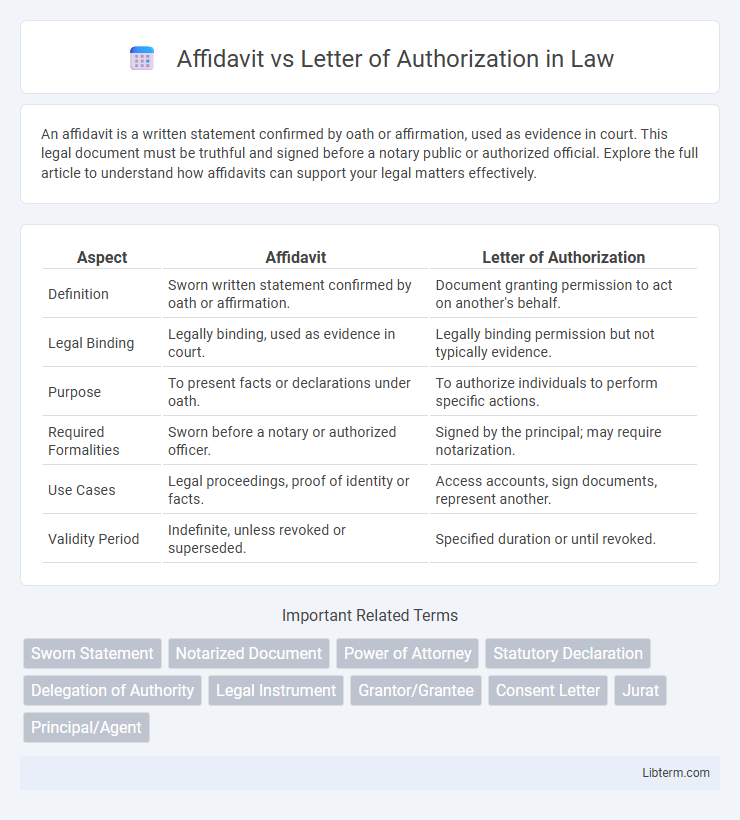An affidavit is a written statement confirmed by oath or affirmation, used as evidence in court. This legal document must be truthful and signed before a notary public or authorized official. Explore the full article to understand how affidavits can support your legal matters effectively.
Table of Comparison
| Aspect | Affidavit | Letter of Authorization |
|---|---|---|
| Definition | Sworn written statement confirmed by oath or affirmation. | Document granting permission to act on another's behalf. |
| Legal Binding | Legally binding, used as evidence in court. | Legally binding permission but not typically evidence. |
| Purpose | To present facts or declarations under oath. | To authorize individuals to perform specific actions. |
| Required Formalities | Sworn before a notary or authorized officer. | Signed by the principal; may require notarization. |
| Use Cases | Legal proceedings, proof of identity or facts. | Access accounts, sign documents, represent another. |
| Validity Period | Indefinite, unless revoked or superseded. | Specified duration or until revoked. |
Understanding Affidavit and Letter of Authorization
An affidavit is a sworn written statement made under oath, used as evidence in legal matters to verify facts, while a letter of authorization grants permission to a designated person to act on behalf of another in specific situations. Affidavits require notarization to affirm the truthfulness of the content, whereas letters of authorization often need signatures and may require identification documents to validate authority. Understanding the distinct legal functions of affidavits and letters of authorization helps ensure proper documentation for compliance in personal or business transactions.
Definition of an Affidavit
An affidavit is a written statement confirmed by oath or affirmation, used as evidence in legal proceedings. It serves to verify facts and is signed by the affiant before a notary public or authorized officer. Distinct from a Letter of Authorization, which grants permission to act on someone's behalf, an affidavit functions primarily as sworn testimony.
Definition of a Letter of Authorization
A Letter of Authorization is a formal document that grants an individual or organization the legal authority to act on behalf of another person in specific matters, such as financial transactions or business decisions. Unlike an affidavit, which is a sworn statement of facts, a Letter of Authorization specifically delegates powers and responsibilities, often requiring a clear statement of the scope and duration of the authorization. This document is critical for ensuring that authorized parties can perform designated tasks while protecting the rights and interests of the principal.
Key Differences Between Affidavit and Letter of Authorization
An affidavit is a sworn written statement made under oath for legal verification, while a letter of authorization grants permission to act on someone's behalf without requiring an oath. Affidavits are typically used as evidence in courts and must be notarized, whereas letters of authorization are used for delegating tasks such as financial transactions or document handling and generally do not require notarization. The key difference lies in the affidavit's legal binding under perjury laws versus the letter of authorization's role as a formal but non-legal permission document.
Common Uses of Affidavits
Affidavits serve as sworn written statements used frequently in legal proceedings to provide evidence, verify identities, and affirm facts under oath. Common uses include supporting applications for passports, property transactions, court cases, and affidavits of residence or support. Unlike Letters of Authorization, affidavits carry legal weight and may be used to affirm truthfulness for judicial or official purposes.
Common Uses of Letters of Authorization
Letters of Authorization are commonly used to grant permission for third parties to act on behalf of an individual or organization in matters like banking transactions, property management, and legal representation. They provide a clear, written consent outlining specific powers and limitations, ensuring transparency and accountability. Unlike affidavits, which serve as sworn statements of fact, Letters of Authorization primarily focus on delegating authority rather than verifying information.
Legal Validity and Admissibility
An affidavit is a sworn statement made under oath, granting it strong legal validity and high admissibility in courts as evidence. A letter of authorization, while legally recognized for permitting actions or representation, generally lacks the sworn status, which may limit its evidentiary weight. Courts typically prioritize affidavits for proof due to their formal attestation and potential penalties for perjury.
Steps to Draft an Affidavit
Drafting an affidavit involves clearly stating the facts in a first-person narrative, ensuring each statement is truthful and relevant to the case. The document must be formatted with a heading that includes the title "Affidavit," followed by the declarant's full name, address, and a detailed account of the facts, ending with a declaration of truth. Finally, the affidavit requires the declarant's signature in the presence of a notary public or authorized officer to validate its authenticity.
Steps to Create a Letter of Authorization
To create a Letter of Authorization, begin by clearly identifying the parties involved, specifying the grantor and the authorized person with full names and contact details. Outline the specific powers or tasks the authorized individual is permitted to perform, including start and expiration dates for the authorization. Ensure the letter is signed and dated by the grantor, and consider having it notarized to enhance its legal validity.
Choosing the Right Document for Your Needs
Selecting between an affidavit and a letter of authorization depends on the legal purpose and level of formality required. An affidavit, a sworn statement made under oath before a notary or authorized official, is ideal for verifying facts or affirming truthfulness in court or official matters. A letter of authorization grants permission to act on someone's behalf and is suitable for delegating authority in business transactions or personal affairs where proof of consent is essential but less formal than an affidavit.
Affidavit Infographic

 libterm.com
libterm.com